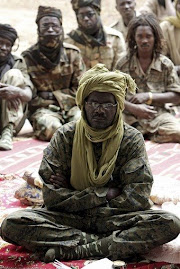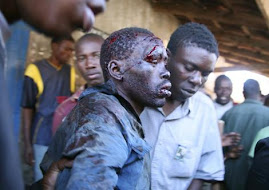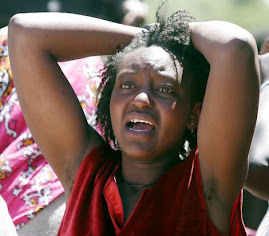The Government of South Sudan (GOSS) under the leadership of H.E. First Vice-President, Lt-Gen. Salva Kiir Mayardit, had emphasized and reemphasized its commitment to fighting corruption in South Sudan. This noble task was backed up by an Anti-Corruption Commission. This commission was specifically created to fight corruption in all its forms in South Sudan.
Like it was mentioned in one of this author's articles entitled "Legislators Ought to Probe GoSS for the Whereabouts of $702m", (http://ohiyok-oduho.blogspot.com/search?updated-max=2008-04-14T04%3A33%3A00-07%3A00&max-results=7) early in March, 2009, the South Sudan Legislative Assembly (SSLA) refused to approve a debate on a case involving cash amounting to 6.26 Billion Sudanese Pounds for food strategic reserve (food security) for South Sudan. It is reported that out of this cash only one state implemented what was required of it. The rest of the cash could not be traced and this seems to be supported by the SSLA leadership, which recently passed an anti-corruption bill. "The south Sudan legislative assembly has endorsed the anti-corruption bill for the year 2009",(http://www.gossmission.org/goss/index.php?option=com_content&task=view&id=772&Itemid=136).
On March 31st, 2009, Al-Wifaq Newspaper reported the disappearance of 14 Billion Sudanese Pounds in Northern Bahr Al-Ghazal State. This cash disappeared from the State Ministry of Education in Aweil. The cash was distributed amongst the officials at the Ministry. The State Education Minister in Aweil discovered the racket and quickly reported the theft to the police who are said to be holding the culprits.
This theft is occurring irrespective of the GOSS President's insistence to fight corruption in his government. "GOSS president has reiterated before the donors' conference in Juba his determination to eradicate corruption in the South", (http://www.sudantribune.com/spip.php?article20921). The President of GOSS declared his war against corruption in 2007. The menace called corruption continues to this date in South Sudan. Why? It's an infectious disease that seems to have been easily transmitted to the other people in GOSS administration. However, the fact that it's a disease, the SPLM Secretary-General, Pagan Amum, confirmed it. He said "corruption is a true disease in the South", (http://www.newsudanvision.com/index.php?option=com_content&view=article&id=1598:south-sudan-passes-anti-corruption-bill-&catid=1:sudan-news-stories&Itemid=6). There are some factors that contribute to the continuation of corruption in South Sudan:
*Tribalism strengthened by poverty and protection of corrupt officials by the decision-makers in GOSS on sectional and tribal lines;
*Inability of the Anti-Corruption Commission to investigate and arrest those corrupt officials in GOSS; and
*Parliament's inability to play its important role of enacting laws against corruption and its practices in South Sudan.
Tribalism, poverty and protection of corrupt officials via tribal bias
Tribe is positive thing; but tribalism is negative and on the line of tribalism, a senior government official would squander public funds but a senior relative from his/her tribe within that particular ministry any other higher institution in GOSS would bail the thief out. What happened here is that the corrupted cash is divided between the two or more as is the case in Aweil. These two or more relatives are both suffering from poverty and certainly want to live like the others who have been helped by their tribesmen in GOSS. This could be seen from those who were accused of corruption, arrested but later on released in Juba. There is hope, at least with the new anti-corruption bill, that those officials who divided between themselves Four (4) Billion Sudanese Pounds in Aweil, should be brought to books. If this happens, tribalism and poverty may differ in their close relationship in GOSS.
Anti-Corruption Commission
The Anti-Corruption Commission seemed to have been created to impress the donors. Otherwise, how could the commission fail to arrest and charge a single corrupt person? The answer to this question is simple: the commission is powerless – it has no powers to arrest and investigate unless such is done as a public relations exercise – smoke-screening – if you like. The Anti-Corruption Commission should not be blamed for failing to arrest anyone in the South. But now that a bill has been passed to help enact laws for the commission to carry out its duties, we hope that the commission would do its best to function and report any hindrance to its work. "In an effort to combat corruption, the SSLA passed the long awaited anti-corruption bill today in its third and final reading", (http://www.newsudanvision.com/index.php?option=com_content&view=article&id=1598:south-sudan-passes-anti-corruption-bill-&catid=1:sudan-news-stories&Itemid=6).
Parliament's failure to play its role
The parliament of South Sudan has some of the best legislatures this country has. The problems of corruption and insecurity in South Sudan are directly attributed to the poor or corrupt leadership within the SSLA. It should be noted, however, that SSLA leadership had ignored to discuss matters such as the 6.26 Billion Sudanese Pounds meant for strategic food reserve or food security. This amount was seriously mishandled by various states and some GOSS top officials and by refusing to debate it, SSLA is encouraging corruption.
Reactions from Anti-Corruption Commission and SSLA
The Chairperson of the Anti-Corruption Commission, Dr Pauline Cuir Riak, was happy and had the following to say: “I am confident that with the provision of the bill, we shall be able to carry out our work effectively without any threats." "In an effort to combat corruption, the SSLA passed the long awaited anti-corruption bill today in its third and final reading", (http://www.newsudanvision.com/index.php?option=com_content&view=article&id=1598:south-sudan-passes-anti-corruption-bill-&catid=1:sudan-news-stories&Itemid=6).
Dr Jimmy Wongo, a legislator in SSLA, conquers with Dr Pauline Riak and says that, "the bill must be accompanied with strong measures to bring all corrupt agencies to law. Nobody has been prosecuted in the three years since the establishment of GOSS", (http://www.newsudanvision.com/index.php?option=com_content&view=article&id=1598:south-sudan-passes-anti-corruption-bill-&catid=1:sudan-news-stories&Itemid=6).
Responding to the same bill, SSLA Speaker, James Wani Igga, said: "a nation cannot work effectively with the absence of an anti-corruption bill." He hailed the adoption of the legislation as a milestone for the Southern Parliament.
Conclusion
The best way to deal with this issue of corruption is not just the passing of anti-corruption bill. It's the seriousness to follow the implementation of such bills and taking those who undermine such implementation to task, including dismissal from public offices. This measure, coupled up with a commitment from the Anti-Corruption Commission to do its work unhindered, corruption may be eradicated for ever in South Sudan.
The disappearance of the Four (4) Billion Sudanese Pounds from the ministry of education in Aweil may be a blessing in disguise. Those who are involved in the theft of this huge sum of cash must really be dealt with; now that the SSLA had passed the anti-corruption bill.
Just like the SSLA Speaker said, "a nation cannot work effectively with the absence of an anti-corruption bill." Now that the anti-corruption bill has been passed, may GOSS, SSLA together with the Anti-Corruption Commission review the previous cases, like 702 Million Dollars which disappeared sometimes back, the disappearance of the 14 billion Sudanese Pounds in Aweil and of course, the Al-Cardinal scandal. Failure to address the cases that were known to be serious corruption matters in the past would encourage future corruption in South Sudan. It will amount to injustice to prosecute others while protecting other corrupt officials within GOSS. Best wishes for a success against corruption in South Sudan.
















No comments:
Post a Comment